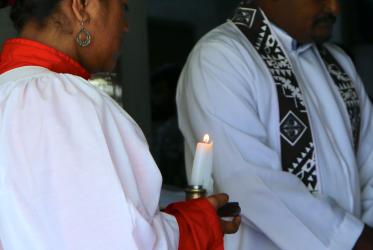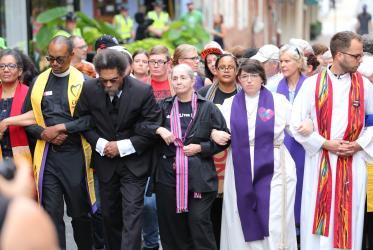Bible Study 5
Sarojini Nadar
1 Kings 21:1-22
Translation: New Revised Standard Version
Naboth’s Vineyard
1Later the following events took place: Naboth the Jezreelite had a vineyard in Jezreel, beside the palace of King Ahab of Samaria.2And Ahab said to Naboth, “Give me your vineyard, so that I may have it for a vegetable garden, because it is near my house; I will give you a better vineyard for it; or, if it seems good to you, I will give you its value in money.’3But Naboth said to Ahab, ‘The Lord forbid that I should give you my ancestral inheritance.”4Ahab went home resentful and sullen because of what Naboth the Jezreelite had said to him; for he had said, “I will not give you my ancestral inheritance.” He lay down on his bed, turned away his face, and would not eat.
5 His wife Jezebel came to him and said, “Why are you so depressed that you will not eat?”6He said to her, “Because I spoke to Naboth the Jezreelite and said to him, ‘Give me your vineyard for money; or else, if you prefer, I will give you another vineyard for it’; but he answered, ‘I will not give you my vineyard.’”7His wife Jezebel said to him, “Do you now govern Israel? Get up, eat some food, and be cheerful; I will give you the vineyard of Naboth the Jezreelite.”
8 So she wrote letters in Ahab’s name and sealed them with his seal; she sent the letters to the elders and the nobles who lived with Naboth in his city.9She wrote in the letters, “Proclaim a fast, and seat Naboth at the head of the assembly;10seat two scoundrels opposite him, and have them bring a charge against him, saying, ‘You have cursed God and the king.’ Then take him out, and stone him to death.”11The men of his city, the elders and the nobles who lived in his city, did as Jezebel had sent word to them. Just as it was written in the letters that she had sent to them,12they proclaimed a fast and seated Naboth at the head of the assembly.13The two scoundrels came in and sat opposite him; and the scoundrels brought a charge against Naboth, in the presence of the people, saying, “Naboth cursed God and the king.” So they took him outside the city, and stoned him to death.14Then they sent to Jezebel, saying, “Naboth has been stoned; he is dead.”
15 As soon as Jezebel heard that Naboth had been stoned and was dead, Jezebel said to Ahab, “Go, take possession of the vineyard of Naboth the Jezreelite, which he refused to give you for money; for Naboth is not alive, but dead.”16As soon as Ahab heard that Naboth was dead, Ahab set out to go down to the vineyard of Naboth the Jezreelite, to take possession of it.
Elijah Pronounces God’s Sentence
17 Then the word of the Lord came to Elijah the Tishbite, saying:18Go down to meet King Ahab of Israel, who rules* in Samaria; he is now in the vineyard of Naboth, where he has gone to take possession.19You shall say to him, “Thus says the Lord: Have you killed, and also taken possession?” You shall say to him, “Thus says the Lord: In the place where dogs licked up the blood of Naboth, dogs will also lick up your blood.”
20 Ahab said to Elijah, “Have you found me, O my enemy?” He answered, “I have found you. Because you have sold yourself to do what is evil in the sight of the Lord,21I will bring disaster on you; I will consume you, and will cut off from Ahab every male, bond or free, in Israel;22and I will make your house like the house of Jeroboam son of Nebat, and like the house of Baasha son of Ahijah, because you have provoked me to anger and have caused Israel to sin.”
The text in its context
The Books of Kings record that Jezebel, a princess from Phoenicia whose ancestors were Canaanites, is brought to the northern kingdom of Israel to marry King Ahab, son of Omri (1 Kings 16:31). Jezebel’s father is Ethbaal of Tyre. Baal was the agricultural and fertility deity of the Canaanites, while Yahweh was the deity of the Israelites and of King Ahab whom Jezebel married. Unlike Ruth, who declares when she chooses to stay with Naomi “Your God shall be my God,” Jezebel brings with her her God Baal and his consort Asherah. 1 Kings 16:31-33 shows that Ahab readily accepted Baal and even builds an altar for worship:
31 And as if it had been a light thing for him to walk in the sins of Jeroboam son of Nebat, he took as his wife Jezebel daughter of King Ethbaal of the Sidonians, and went and served Baal, and worshipped him.32He erected an altar for Baal in the house of Baal, which he built in Samaria.33Ahab also made a sacred pole. Ahab did more to provoke the anger of the Lord, the God of Israel, than had all the kings of Israel who were before him.”
We are urged by scholars (and the Deuteronomistic writer) that it is within this context (a context of opposing religious beliefs) that the story of Naboth’s vineyard needs to be understood: That Jezebel acts according to her “idolatrous” religious beliefs and obtains land through evil and murderous ways. In other words, there is room for more than one interpretation of the text, depending on the perspective from which one views the story. We may be challenged to imagine the circumstances as a reader with different presuppositions might understand it.
In 1 Kings 21:2, Ahab asks Naboth to give him his vineyard, and he will pay him accordingly either with another vineyard or the worth of the land in money. Naboth refuses to sell or trade: “The Lord forbid that I should give you my ancestral inheritance.” King Ahab, who has apparently according to earlier accounts “converted” to the worship of Baal, seems nevertheless convinced by Naboth’s insistence that Yaheweh has given him this ancestral land and therefore he cannot part with it. The idea that it is Yahweh who apportions land and that family are to maintain their land is found in Numbers 27:5–11.
By asserting that Ahab can still acquire the land because he is king, Jezebel shows no respect for Yahweh’s law and instead simply invokes the “right” of the king to grab this property. Furthermore, as Francis Anderson points out, even if the owner dies, the inheritance still goes to the family, according to the Law. Here, however, the land is simply given to the king. Ironically, Jezebel invokes the law of blasphemy to have Naboth killed on trumped-up charges. Naboth is stoned according to law found in Leviticus 24:13-16.
Anderson asserts that: “Readers of the story of the judicial murder of Naboth in 1 Kings 21 share the indignation of the historian of this dastardly outrage and readily endorse Elijah's sentence against Ahab.” He goes on to say that, “Commentators have rightly seen in the episode a clash of Israelite and Canaanite ideas of kingship, of citizenship, and of property. Naboth refused to relinquish his patrimony (vs. 3); Jezebel thought that the king could do anything he pleased (vs. 7).” [1]
The text in our context
On this reading, King Ahab with the support of Queen Jezebel was trying to drag Israel into line with the world of the market, where land could be bought and sold rather than held in perpetuity by a single family. One of the king's subjects, Naboth, was resisting him, not because the price was too low or even because he wanted to hold on to a vineyard. The land had been allocated to his clan in ancient times as part of the Israelites' covenant with God as a community of liberation. Here two economic systems are competing with each other: the economy of Yawheh and the economy of Baal. King Ahab was introducing his modernization plan in the name of efficiency, productivity and prosperity. The Baal economy recommended by his wife from Tyre was a perfect ideology to pursue the plan. However, for Naboth, justice, equality and communality in the Yawheh economy inherited from the Exodus community were a nonnegotiable matter of faith.
While this seems to be the “common-sense” view of the story, based as it is in a socio-historical reading of the text – i.e., “evil” Jezebel and “good” Elijah—Phyllis Trible has troubled this polarity through a literary reading of the text. She suggests that while the Deutronomists draw the lines very clearly between the two polarized figures, the actual text remains “malleable…ever open to new configurations.” [2]
Perhaps a fair reading of the text requires us to oscillate between the two scholarly readings. On the one hand, Jezebel is the “evil queen” who murders an innocent man so that her husband could grab land that did not belong to him. On the other hand, we have to be aware of whose lenses we read the text through. Trible asserts that:
In a pro-Jezebel setting Elijah would be censured for murdering prophets, for imposing his theology on the kingdom, for inciting kings to do his bidding, and for stirring up trouble in the land. The epitaph for him would be, ‘See now to this cursed male…’ By contrast, Jezebel would be held in high esteem for remaining faithful to her religious convictions, for upholding the prerogatives of royalty, for supporting her husband and children, and for opposing her enemies unto death. The epitaph for her would be, "My mother, my mother!... Opposites converge. Gender, class, ethnicity, religion, and land: dissimilarities produce similarities to unite the incompatible.[3]
Therefore it is possible to consider this text to be more complex than it at first appears. We must closely scrutinize our own notions in the many struggles for land and justice that we find today in Palestine, Zimbabwe, Iraq, and elsewhere, including places where indigenous peoples are trying to reclaim land taken from them by “legitimate,” legal means. Our very ideas of property, ownership, acquisition, need, and rights to land merit real scrutiny in light of this text. Any conclusions we draw deserve to be tested in the light of alternate viewpoints held by neighbours of other communities, traditions, classes or genders. In the end, through the prophetic intervention of Elijah, King Ahab questioned his own actions, repented of them (1 Kings 21:27) and sought justice in the land.
Questions for reflection and discussion
- Read the text aloud in your group. Appoint volunteers to read those parts that are assigned to them in the text (Invite volunteers to be dramatic).
- Narrator
- Ahab
- Naboth
- Jezebel
- Jezreelites
- God
- Elijah
- Reflect on what you think the themes of the text and defining traits of each character are.
- In what ways are we as individuals or communities aligned with Jezebel and with Elijah and the Israelites in current-day contexts?
- In what tangible ways can we repent as individuals, churches, and nations for our confiscation of others peoples' inheritances and rights?
- Does the ecumenical movement need to be prophetic even in the market? What is the difference between God’s justice and the “market justice”?
Prayer
God of life,
in whom we live and move and are:
Speak to us clearly, that we may live wisely.
Open our ears, that we may hear and one another.
Forgive us our confusion and our many wrong choices;
lead us to repentance when we err
and empower us in a renewed struggle for your justice. Amen.
About the author
Sarojini Nadar is associate professor and director of the Gender and Religion Programme at the University of Kwazulu-Natal, South Africa.
[1] Francis Andersen, "The Socio-Juridical Background of the Naboth Incident," Journal of Biblical Literature (1966), 46.
[2] Phyllis Trible, “Exegesis for Storytellers and Other Strangers,”Journal of Biblical Interpretation 114/1 (1995). 3.
[3] Ibid., 17 -18.





